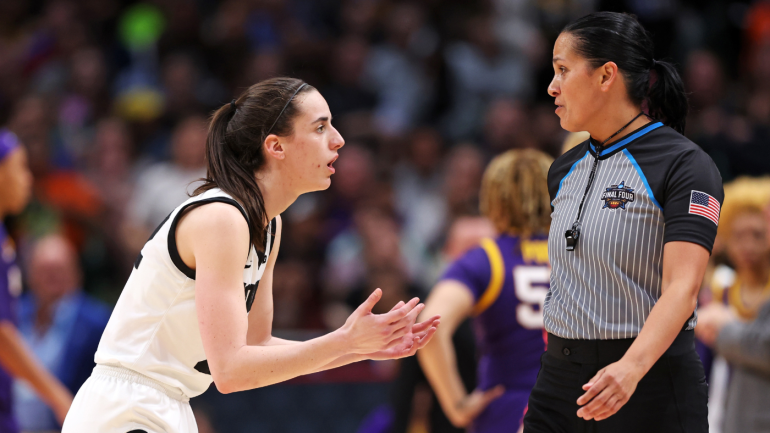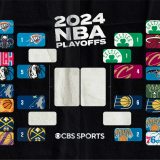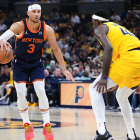
Caitlin Clark might be the best show to ever land on the women's college basketball scene, and the ratings prove it. The Athletic reported that the Iowa-South Carolina Final Four game will, when all the numbers tally up, almost certainly go down as the most viewed women's college basketball game in history.
This is no disrespect to any other player on that court Saturday night, but those numbers can be directly tied to Clark, who has single-handedly brought millions of viewers to the women's game.
People like myself, who haven't watched a full women's college basketball game -- or a full WNBA game for that matter -- in years, made sure to be in front of a television for the Clark show in the national title game on Sunday afternoon, only to see Clark get hit with her third foul in the second quarter, her fourth foul in the third quarter, and as a result have to sit on the bench for stretches and play extremely carefully when she was out there.
Iowa lost the game to a better LSU team, which was dealing with some foul trouble of its own (Angel Reese, a fantastic player, had to come out an unplanned times; same with Ladazhia Williams). That's not the point. The biggest loss of the night had nothing to do with the final score. The biggest loss of the night was the opportunity the women's game had to put its best foot forward for the full 40 minutes.
Basketball at the collegiate and professional levels, is about one thing: Entertainment. In this business model, there are millions of dollars at stake -- hundreds of millions of dollars in some cases -- and a player like Clark being on the floor to entertain is at the core of that model. You want WNBA players to make more money? More people need to watch the games. You want more people to watch the games? Don't take the Caitlin Clarks of the world off the floor.
So what is the solution, you ask? Simple. In the words of my colleague Colin Ward-Henninger, who has been harping about this forever, eliminate foul outs. Forget your tradition or your claims that this is some time-honored strategy to get the other team's best player in foul trouble. Times have changed. There are too many entertainment options for people now. You can't give the public a reason to change the channel if their favorite player is riding the pine for 30 minutes of real time.
People pay too much money, either in the form of tickets or cable packages, to watch the best players play. That women's national championship game was a letdown once Clark, who was on fire to start the game, and Czinano got in foul trouble.
Indeed, it's not the actual foul outs that are the problem. It's the fear of the foul out. This happens in NBA games all the time. Any Golden State Warriors fan will tell you about the frustration of watching Stephen Curry get hit with an early second or third foul for some dumb reach and having to go to the bench. The entire sports world wants to see Stephen Curry play basketball, not watch basketball. And that goes for every other star player.
And they also want to see those stars have their full arsenal of support, so these games can be decided by the players on the court, not the ones off of it. For the NBA, competition for viewers is only going to stiffen as more and more entertainment options become available for a nation of people who have less and less money to spend.
There are a lot of dumb rules in basketball. Being able to intentionally foul when up by three points at the end of a game will drive me nuts until the day I die. You're supposed to be punished for fouling, not given what amounts to major competitive advantage.
Am I being a hypocrite to say, in one breath, that you are supposed to be punished for fouling, while in the next breath saying we should take away the ultimate punishment for fouling. No. For starters, this is about not punishing the paying customers. Second, you could still punish teams and players for hacking.
In the NBA, a player get disqualified on his sixth foul. My proposal would be for every foul starting with the sixth to result in two free throws plus possession. That's what they do for take fouls in the NBA now, which, if you're not familiar with take fouls, is when a defender intentionally fouls an opposing player with the goal of stopping a transition opportunity.
This season, the NBA decided to punish that action because it's bad for entertainment. People don't come to the games or watch the games at home on their pricey league-pass packages to get cheated out of the thrill of a fast break to instead watch a free-throw contest, and they certainly don't pay to watch the best players not play.
Never in a million years would I expect the NBA to do anything that seems this radical. Change terrifies people in the most confusing way. But let's be clear: the only thing radical going on is to potentially let major chunks of your audience change the channel because the player they came to watch play isn't playing.
It's a problem when it comes to load management. It's a problem when it comes to foul outs. The NBA would be wise the heed the lesson of Caitlin Clark and start thinking progressively and proactively about this.






















